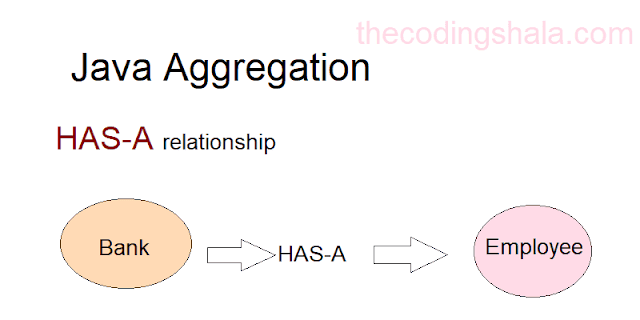Java Aggregation - The Coding Shala
Home >> Learn Java >> Java Aggregation
Output:
Java Aggregation
Java Aggregation is a type of Association. It is a relationship between two classes like association. If a class has an entity reference, it is known as Aggregation. Aggregation is a directional association that means it is strictly a one-way association. Java Aggregation represents a HAS-A relationship.
Aggregation is a weak association. An association is said to be aggregation if both Objects can exist independently that means if one object is not there still another object can be used. For example a Bank and an Employee object. Bank has an employee. The Bank has multiple employees but an Employee can exist without a Bank also.
Another Example is a Class and a Student Object. Class and Student can exist independently.
Point to Remember: Code reuse is best achieved by aggregation.
Example of Aggregation in Java
The following example of Student and Address explains the Java Aggregation:
//Java Aggregation Example class Address{ String city; String State; Address(String city, String State){ this.city = city; this.State = State; } } class Student{ int id; String name; Address address; //this is Aggregation, using Address entity reference Student(int id, String name, Address addr){ this.id = id; this.name = name; this.address = addr; } void Display(){ System.out.println("Student info below"); System.out.println(this.id+" "+this.name); System.out.println("Address is: "+address.city+","+address.State); } } class Main{ public static void main(String[] args){ Address addr1 = new Address("Pune", "Maharashtra"); Student s1 = new Student(1, "Akshay", addr1); //need to pass Address Object s1.Display(); System.out.println(); Address addr2 = new Address("Jaipur", "Rajasthan"); Student s2 = new Student(2, "Rahul", addr2); s2.Display(); } }
Student info below 1 Akshay Address is: Pune,Maharashtra Student info below 2 Rahul Address is: Jaipur,Rajasthan
In the above example, the Student has an address and Object address or Student object that can exist independently. Here we use Address object in Student class as a reference.
Other Posts You May Like

Comments
Post a Comment